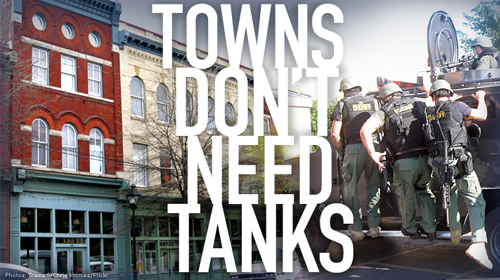
A SWAT team spent called The Garden of Eden in Arlington, Texas last month. They expected to find a few marijuana plants. They didn't. What they found instead: 17 blackberry bushes, 15 okra plants, 14 tomatillo plants, native grasses and sunflowers.
Even if they had found marijuana, would that justify holding terrified residents of the farm at gun point for at least half an hour? Would it justify using weapons created for overseas combat theatres?
Would it justify treating people in this country like wartime enemies?
The answer is no. In service of fighting the failed War on Drugs, too many police officers have been told they are soldiers fighting a war. This is a problem. We are not the enemy.
So how did we get here? How have our domestic police forces gotten to the point where a 10-hour raid of an organic farm is seen by officers as a justified ã even routine ã part of the War on Drugs? In the 1960s, some police departments developed SWAT (Special Weapons and Tactics) teams ã elite teams of officers trained to use military tactics and weapons ã for use in very rare, high risk situations like those involving riots or hostages. But, as nationwide fervor for fighting the War on Drugs took hold in the 1980s, police departments began to expand their use of SWAT ã no longer used only in exceptional circumstances, militarized police began to be a routine fixture in everyday drug law enforcement. This trend continued into the 1990s, as SWAT teams became ever more common across America and a staple law enforcement tool used in ordinary police work. In the name of fighting the drug war, police departments nationwide have stockpiled wartime tools for use on our own soil ã and that's how we've gotten to the ludicrous extreme of treating organic farmers like wartime enemies.
How have domestic law enforcement agencies gotten access to all of this military weaponry? Billions of dollars' worth of military weapons and equipment is available to local police departments through grant programs administered by federal agencies such as the Departments of Defense, Justice, and Homeland Security. This mission creep is a problemã the tools and tactics used in combat theaters abroad are being turned on our communities at home.
We launched our 25-state investigation into the militarization of police in March because little is known about the unnecessary excesses of the War on Drugs, including the impact of excessively militarized policing on people, families, and communities. Too little is known about how much military equipment law enforcement agencies have, why they have it, and how they are using it.
What we do know is that the American people have a right to know about their police department's military equipment and how it is being used. By providing police with weapons and tactics made for war, we run the risk of encouraging the police to act as though they are at war with the very communities that they are supposed to be protecting and serving. But that's not all. Militarizing the police can also undermine public safety. Law enforcement works when the people trust the police; would you trust a police officer driving a tank through your town? Why should we trust SWAT officers who raid the Garden of Eden, holding people at gunpoint, based on unfounded rumors of a few marijuana plants?
For more on the âü¯áû颈§Ý§Ã¿«'s 25-state investigation into the militarization of America's police, click here.
Learn more about police brutality and other civil liberties issues: Sign up for breaking news alerts, , and .

